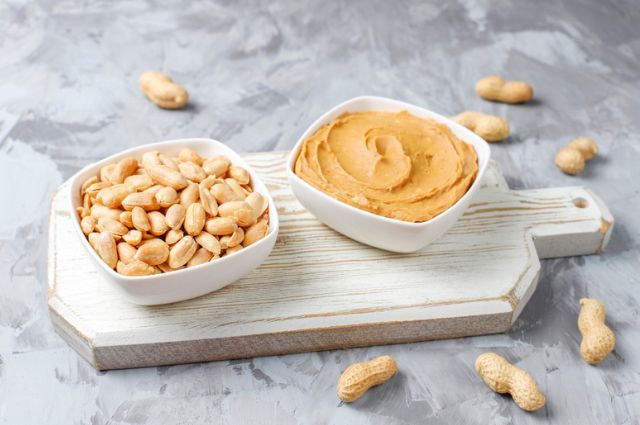
Peanut butter is a tempting choice for a midnight snack, because its delicious flavour, crunchy texture, and the perfect balance of saltiness and sweetness of peanut butter. Many health benefits associated with peanut butter before bedtime. Promoting muscle growth, regulating blood sugar levels, and enhancing the overall quality of your sleep, thanks to its exceptional nutritional composition.
This creamy peanut butter spread is not just a delectable treat; it’s a powerhouse of essential nutrients that can work wonders for your body and well-being. Let’s delve into the science behind this nighttime delight and explore how it can be a game-changer for your health and sleep.
Promotes Better Sleep
One of the most significant benefits of eating peanut butter before bed is its potential to promote better sleep. This is primarily due to the presence of tryptophan, an essential amino acid found in peanut butter. Tryptophan is a precursor to serotonin, a neurotransmitter that plays a crucial role in regulating sleep. When consumed before bedtime, tryptophan can help the body produce melatonin, the hormone that controls the sleep-wake cycle, leading to improved sleep quality.
Sustained Energy
Peanut butter is a source of healthy fats, protein, and complex carbohydrates, making it a nutritious option to provide your body with sustained energy throughout the night. This can be particularly beneficial for those who experience nighttime hunger or blood sugar fluctuations, as it can help stabilize blood sugar levels and keep you feeling satisfied until morning.
Muscle Recovery and Growth
Peanut butter is rich in protein, making it an excellent choice for individuals who engage in regular physical activity or exercise. Consuming protein before bed can aid in muscle recovery and growth, as the body repairs and builds muscle tissue during sleep. The amino acids in peanut butter are particularly valuable in this regard, helping to repair and strengthen muscles while you rest.
Also know: Should you Eat Peanut Butter Before or After Workout?
Weight Management
Contrary to the misconception that eating before bed can lead to weight gain, a small, balanced snack such as peanut butter can actually be beneficial for weight management. Peanut butter’s combination of healthy fats and protein helps to promote satiety, reducing the likelihood of late-night cravings for unhealthy snacks or overeating in the morning. It can also help prevent blood sugar spikes, which are often associated with weight gain.
Nutrient-Rich Option
Peanut butter is packed with essential nutrients, such as vitamin E, magnesium, potassium, and antioxidants. These nutrients are not only beneficial for your overall health but can also support relaxation and muscle function, making it an excellent choice for a bedtime snack. Additionally, peanut butter contains heart-healthy monounsaturated fats, which can contribute to overall well-being.
Brain Health
Peanut butter also contains various vitamins and minerals, including niacin and folate, which are essential for proper brain function. Niacin is known to support nerve function, while folate plays a role in mental health. Consuming peanut butter before bed can contribute to improved cognitive function and overall brain health.
Easy and Convenient
The convenience of peanut butter cannot be overstated. It requires minimal preparation and can be eaten on its own or incorporated into various snacks or meals. This ease of consumption makes it a practical choice for a bedtime snack, especially when you’re too tired to prepare a more elaborate option.
Some key nutritional components of peanut butter include:
Healthy Fats
Peanut butter is rich in healthy polyunsaturated and monounsaturated fats. These fats are heart-healthy and play a crucial role in maintaining overall well-being.
Protein
Protein is essential for muscle repair and growth. Peanut butter is an excellent source of plant-based protein, making it an ideal choice for those looking to promote muscle recovery during sleep.
Fiber
Fiber aids in digestion and promotes a feeling of fullness, which can prevent midnight hunger pangs and improve sleep quality.
Sleep and Nutrition: A Complex Relationship
The relationship between nutrition and sleep is indirectly related. Before bedtime, what you’re consuming is significantly impact the quality of your sleep. Here’s how peanut butter may contribute to better sleep:
Tryptophan Content
Tryptophan is an amino acid that is a precursor to serotonin, a neurotransmitter associated with relaxation and sleep. Peanut butter contains tryptophan, potentially helping you relax and fall asleep more easily.
Stable Blood Sugar
Peanut butter’s low glycemic index means it can help stabilize blood sugar levels, preventing sudden spikes and crashes during the night that may disrupt your sleep.
Satiety and Hunger Control
The combination of protein and healthy fats in peanut butter can keep you feeling full throughout the night, reducing the chances of waking up due to hunger.
Potential Benefits of Consuming Peanut Butter Before Bed
When consumed in moderation, peanut butter before bed can offer several potential benefits:
Improved Sleep Quality
The amino acids and nutrients in peanut butter may help relax your body, resulting in a more restful night’s sleep.
Muscle Recovery
The protein in peanut butter can aid in muscle recovery and growth, particularly for those engaged in regular physical activity.
Weight Management
Sustained satiety provided by peanut butter may contribute to better weight management and reduced late-night snacking.
How to Incorporate Peanut Butter into Your Bedtime Routine
If you’re considering adding peanut butter to your nighttime ritual, here are some tips:
Moderation is Key: Consume a moderate amount of peanut butter to avoid overloading your digestive system before sleep.
Pair with Carbohydrates: Combining peanut butter with whole-grain crackers or a slice of whole-wheat bread can create a balanced bedtime snack.
Avoid Added Sugars: Opt for natural, unsweetened peanut butter to keep added sugars in check.
Personal Preference: Consider your own dietary needs and preferences when incorporating peanut butter into your bedtime routine.
Conclusion
Peanut butter before bedtime can offer a range of benefits, from promoting better sleep to providing sustained energy and supporting muscle recovery. Its nutrient-rich composition, ease of consumption, and potential to aid in weight management make it an excellent choice for a healthy, satisfying bedtime snack. However, it’s essential to consume peanut butter in moderation to avoid excessive calorie intake. If you’re considering adding peanut butter to your nightly routine, consult with a healthcare professional to ensure it aligns with your specific dietary needs and health goals. Enjoy a good night’s sleep with a spoonful of peanut butter and reap the numerous advantages it has to offer.







